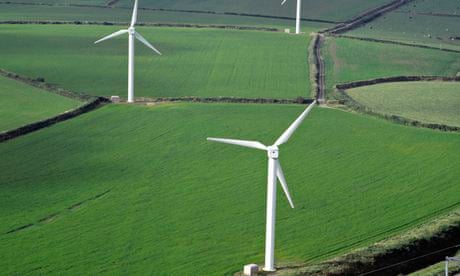Gas and electricity supplier Good Energy has seen a sharp increase in profits, as dissatisfied big six customers switch to its services.
The Wiltshire-based firm, which generates all its electricity from renewables, said customer numbers rose 32% in 2013, helping it more than double pre-tax profits to £3.3m.
The listed company remains a minnow in comparison with the big six, which control 95% of the UK's energy market. But it has been boosted by record numbers of new customers as the government encourages consumers to switch providers in a bid to break the stranglehold of the largest firms.
Good Energy's strong results were published as it emerged that complaints against energy firms had more than tripled in the first quarter of 2014. Figures released by the energy ombudsman on Monday showed a record 10,638 complaints from January to March.
Juliet Davenport, chief executive and founder of Good Energy, said her firm was winning new customers on the back of increased awareness of energy supply. "This is a debate that is long overdue. People are becoming interested in where their power comes from, how it is generated."
Good Energy's electricity customers increased by 25% to 40,000 in 2013, while its number of gas customers rose by 76% to 15,000. The firm has a further 59,000 households and organisations who generate their own energy through roof-top solar panels and use its feed-in-tariff services – a rise of 28% on 2012.
The company had seen similar rates of growth since the start of the year, according to Davenport, with competitive pricing also playing a role in attracting new customers. "Without direct debit discounts we are cheaper on average than the big six now."
The political furore over energy prices has put small providers into the limelight like never before. Last year, Greg Barker, the energy and climate change minister, called for "a vast new army of disruptive new energy players" to turn a market dominated by the big six into the "big 60,000". The big six comprise Centrica, SSE, RWE npower, E.ON, Scottish Power and EDF.
Davenport said she backed the decision of the regulator Ofgem to refer the energy sector to the newly created Competition and Markets Authority for full-scale investigation. "We welcome anything that could bring transparency and trust into energy," she said, adding that change would also come from individuals and businesses generating their own heat and electricity.
She said. "Nearly a million households are generating power for themselves, this is going to be a key way we see competition coming into this market place, where individual consumers have the power."
Shares in Good Energy, which launched in 1999 under a different name, rose by 7.5% to 290.5p after its results were released. The shares have almost doubled over the past 12 months.
The company generates 60% of its electricity from wind power and last week began construction on its second windfarm – an 8.2MW site in South Yorkshire, which is expected to generate enough electricity for up to 5,000 homes. This adds to its original 9.2MW site in Cornwall.
Davenport appears relaxed about the political opposition to windfarms, which could lead to a Conservative party pledge to ban the construction of onshore windfarms.
"If you look at the general polling situation, we are still seeing a majority of people in favour of renewables and onshore wind," she said. "Onshore wind is a proven low cost low-carbon energy secure technology. Renewables are now delivering 13% of our energy requirements in the UK. Pragmatically it is a very sensible technology, I think there will always be political sides and that is the same in any energy technology."

Comments (…)
Sign in or create your Guardian account to join the discussion